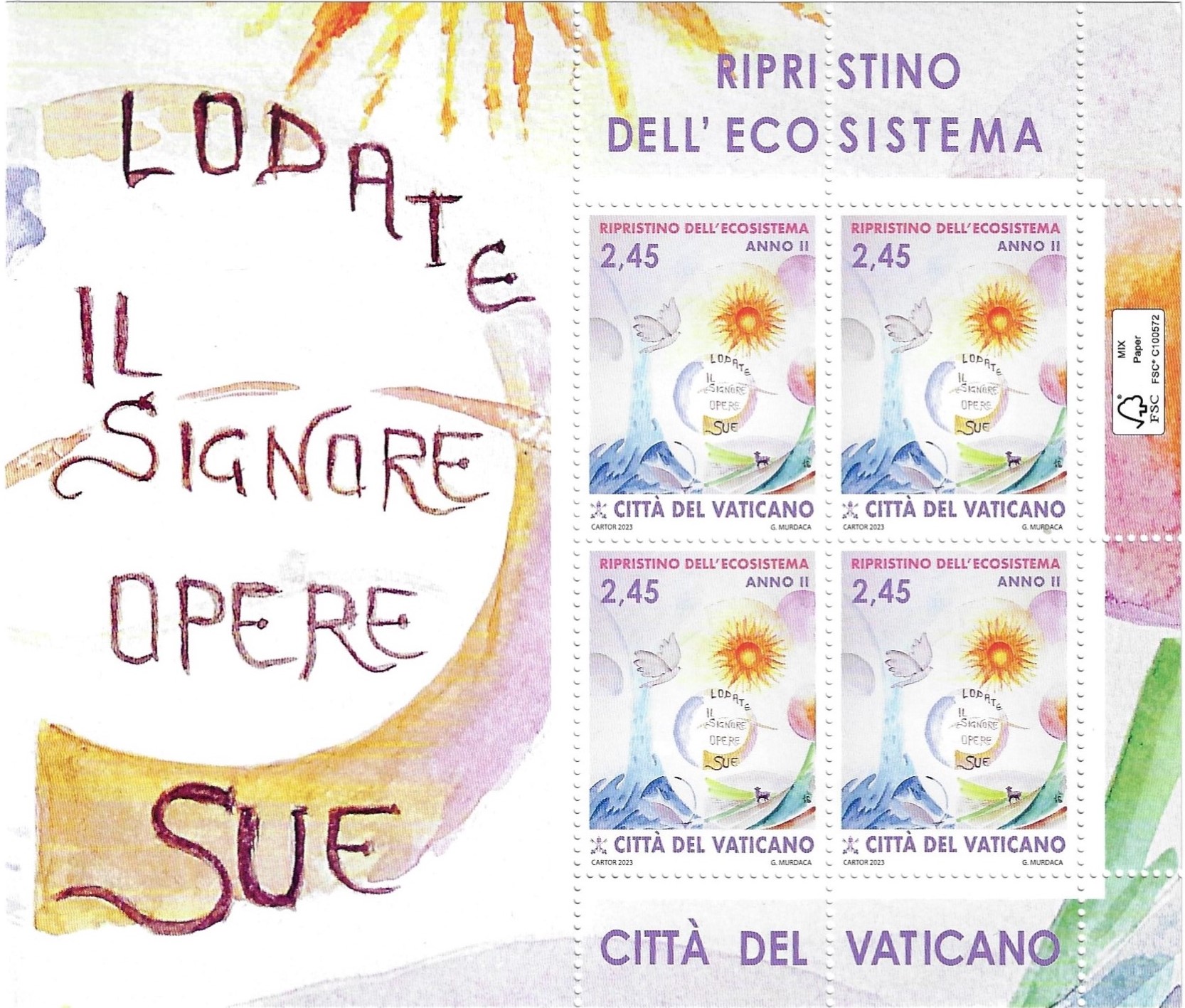
Home


 Ecosystem Restoration, Year 2 Date Issued: September 21, 2023 Face Value: €0.10, €0.15, €2.45 Perforation: 13.25 x 13 Scott #1834,#1835, #1836 In 2023, the Vatican issued a second set of stamps in a ten-year cycle dedicated to Ecosystem Restoration. The set, shown above and issued on September 21, 2023, consists of three stamps. In addition, the €2.45 stamp was issued as a mini-sheet of four (shown at the bottom of this article). The first stamp of the series, issued in 2022, was the unique embroidered stamp shown here:  Ecosystem Restoration, Year 1 Scott 1804 (2022) On March 1, 2019 the United Nations General Assembly proclaimed 2021 – 2030 to be the United Nations "Decade of Ecosystem Restoration". This initiative backs up the principles presented in the encyclical Letter “Laudato Si” (Praise be to you, my Lord), subheadlined “On Care for Our Common Home”, issued by Pope Francis in 2015. “Laudato Si” has six chapters: 1) What is happening to our common home? 2) The Gospel of Creation 3) The Human Roots of the Ecological Crisis 4) Integral Ecology 5) Lines of Approach and Action 6) Ecological Education and Spirituality The encyclical calls for truth and dialogue on this most critical issue of the 21st century. The encyclical addresses damage to the ecosystem as a global and long-term problem that will result in devastating consequences if not addressed. An obvious problem is that most all of us think in the short-term regarding climate change: how do decisions affect me now? The second problem is a mindset that we only want to deals with problems in our locality: how do decisions affect me where I live? Some say: we have poor in our own locale; poorer nations are not of my concern. The Encyclical is consistent with scriptures and differs with these mindsets. The Pope looks at the poor from a global perspective. The Pope is not indicating to help the poor raise their standard of living. On a much deeper he is speaking about their ability to survive and how will this affect the world community as the Ecosystem deteriorates. Pope Francis lays out the full picture stating that war, starvation, migration, crime, and other catastrophes, along with an overall deterioration of societies, will be directly related to the Ecosystem issue in the 21st Century. He directly states that “to commit a crime against the natural world is a sin against ourselves and a sin against God”. The Encyclical directly speaks about climate change, lack of clean water, loss of biodiversity and other related items as stemming from an exploitation for profits accrued over many decades. He is against the sole assumption that technological remedies alone will solve the problem. The Encyclical quotes Benedict XVI, “technologically advanced societies must be prepared to encourage more sober lifestyles while reducing their energy consumption and improving its efficiency.” The cry of the poor in much of the world must be heard by wealthy nations in this time of crisis. He states that we are faced with two simultaneous issues, an environmental and a social. Francis asks “ what commandment ‘Thou shall not kill’ means where twenty percent of the world’s population consumes resources at a rate that robs the poor nations and future generations of what they need to survive”. The Pope states that the environmental crises can ultimately only be solved if we have global technological development, a development of higher values for the common good of all on the globe, and dialogue. In 2015, Cardinal Sean O’Malley (at the time the Archbishop of Boston) stated the following: “The Holy Father has given us a powerful, careful, prayerful analysis of two great ideas. The first idea, “Our Common Home,” the phrase he uses to describe the environment; the “home" for the human family is in severe danger and needs immediate protection and healing at the global, national and local levels of life. The second idea is that while the threatened state of the environment is a universal challenge affecting us all, those most in danger in the present and future are those already poor and vulnerable, within states and across the globe.Vatican City has continued the issuance of stamps for the Decade of Ecosystem Restoration. In 2024, the stamp show here was released, whose design juxtaposes two visually striking and strongly contrasting images: an unspoiled landscape "akin to the Garden of Eden", and a scene of smokestacks and factories fouling the environment:  Ecosystem Restoration, Year 3 Scott 1867 (2024) The stamp for Year 4, which was just released on September 7, 2025, depicts a mountain landscape of Mount Morrone in Abruzzo, which was the hermitage of Pietro Angelerio (or Pietro da Morrone), the future Pope Celestine V, who served as pope for five months in 1294. An image of the stamp can be seen by clicking on the CFN link below.  Praise the Lord His Works Ecosystem Restoration Minisheet, Scott 1836M (2023) References: |